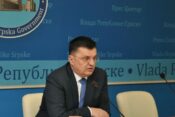
Opposition politicians from across the political spectrum demanded on Wednesday that the Presidency releases a document which will be sent to NATO to the public, with some arguing that it implies Bosnia's future membership in NATO, while others say it means the country gave up that goal.
Bosnia’s three Presidency members said on Tuesday that they finally reached an agreement on appointing the Council of Ministers and sending a document to NATO, which was the central issue that caused the political crisis that was crippling the country since the 2018 election.
Bosnia’s previous ministers continued to serve the posts in a technical mandate for more than a year since the Bosniak and Croat members of the tripartite Presidency, Sefik Dzaferovic and Zeljko Komsic, respectively, refused to approve the appointment of the new Chairman of the Council of Ministers – a member of the party led by their Serb colleague in the Presidency, Milorad Dodik.
The reason was a disagreement over whether Bosnia should send the Annual National Programme (ANP) to NATO, which would activate the country’s Membership Action Plan (MAP) and would represent the next step on the path to membership in the alliance.
NATO remains unpopular with Serbs in both Serbia and in Bosnia's Serb-majority semi-autonomous entity of Republika Srpska (RS) since the alliance launched airstrikes against the Bosnian Serbs during the 1992-95 Bosnian war and against the Serbian military in 1999 during the conflict between Belgrade and ethnic Albanians in Kosovo.
Although it agreed to Bosnia joining NATO about a decade ago, Dodik’s Alliance of Independent Social Democrats (SNSD) changed its mind in recent years and refused to let the country make any step toward NATO membership. In line with neighbouring Serbia, the Serb-majority part of Bosnia, Republika Srpska (RS), adopted a Resolution on Military Neutrality in 2017, which means it opposes membership in any military alliances.
Komsic and Dzaferovic insisted that they will not approve the appointment of the SNSD’s Zoran Tegeltija unless the ANP is sent to the NATO headquarters in Brussels, arguing that Bosnia is obligated to do so by earlier decisions and the law.
On Tuesday, the Presidency members agreed to approve the appointment of Tegeltija and and all other new ministers. They also agreed that Bosnia will send ‘a document’ to NATO, without ever mentioning the word ‘ANP’.
The Presidency members, their parties, foreign officials and ambassadors hailed the development as a compromise which will finally unblock the work of Bosnia’s institutions and the country’s reforms on the path toward EU membership.
“There is no winner or loser among any politicians of policies here. The winners are Bosnia and Herzegovina, all parts of Bosnia and Herzegovina and all the peoples and citizens,” Dzaferovic said.
Dodik said that the document is a “Programme of Reforms” which does not predict any future membership in NATO.
“It says that for every step toward membership in NATO a decision by the Presidency and the Parliament of Bosnia and Herzegovina is necessary and that the decisions will be made in accordance with the stance of all government bodies at the state level,” he said.
Opposition parties, however, argued that they do not know what the ‘document’ exactly contains and that either the Bosniak and Croat Presidency members or their Serb colleague caved in before the demands of the other side.
The Social Democratic Party (SDP) is one of the opposition parties which want Bosnia to send the ANP, and it asked for the document to be released to the public.
The party’s deputy leader Zukan Helez said on Tuesday that Dzaferovic and Komsic gave up on their principle and effectively stopped Bosnia’s NATO path.
“The obvious unconditional capitulation to the wishes of Milorad Dodik is trying to be masked with shameful interpretations on sending some monstrous ‘Programme of Reforms’ instead of the ANP to the NATO headquarters,” Helez said.
He reminded of an earlier statement from the leader of the main Bosniak party, Bakir Izetbegovic, who said that “there will be no NATO path without Milorad Dodik.”
“That happened in the end. In this way, Dodik’s policy of minimising Bosnia and Herzegovina and its institutions has completely triumphed in Sarajevo,” Helez said.
Bosnian Serb opposition parties also asked for the document to be released, except that they argued that it was Dodik who caved in and “betrayed Republika Srpska.”
“I support the proposal by the SDP for us to get that document from Bosnia’s Presidency so we familiarise ourselves with it and discuss it. This is a strategic issue for the future of Bosnia and Herzegovina and its citizens,” said still-acting Security Minister from the opposition Serb Democratic Party (SDS), Dragan Mektic, at a House of Representatives session on Wednesday.
Mektic said that he came across information that “the document is locked up in the safes of Bosnia’s Presidency members” and that “international factors” ordered for it to be concealed from the public until Bosnia gets confirmation that NATO accepted it.
He also said that he found out that the document does not contain the RS Resolution on Military Neutrality, adding that it also says that no institutions at lower government levels will decide on the status of Bosnia’s NATO membership and that it contains a set of issues related to the reform of the defence and security sectors.
“That alone excludes and erases the RS National Assembly Resolution and I think that it is in the interest, especially of the people of the RS and us who are representing them here, to have that document and to see what it contains,” he said.
Mektic asked for a one-hour break so the Presidency submits the document and for its members to come to the session and explain it.
Bosnia’s still acting Minister of Foreign Affairs, Igor Crnadak – also a member of a Bosnian Serb opposition party, the Party of Democratic Progress (PDP) – demanded the same.
“It is important for the seriousness and credibility of the institutions of Bosnia and Herzegovina that this document is released to the public as soon as possible, in the next few hours even,” he said.
Crnadak explained that the Presidency can not expect the Foreign Affairs Ministry to send such an important document which could impact the lives of citizens to NATO without the public knowing what it is.
“It is obvious from the statements that we had the opportunity to see and hear that this means the activation of the Action Plan for Bosnia’s membership and that we have come to a complete twist when it comes to the position of Milorad Dodik, as it says nowhere that the Republika Srpska National Assembly Resolution on Military Neutrality of that entity is included as part of the material which will be sent to Brussels,” he said.
Both ministers will be replaced when the new government is formed.







